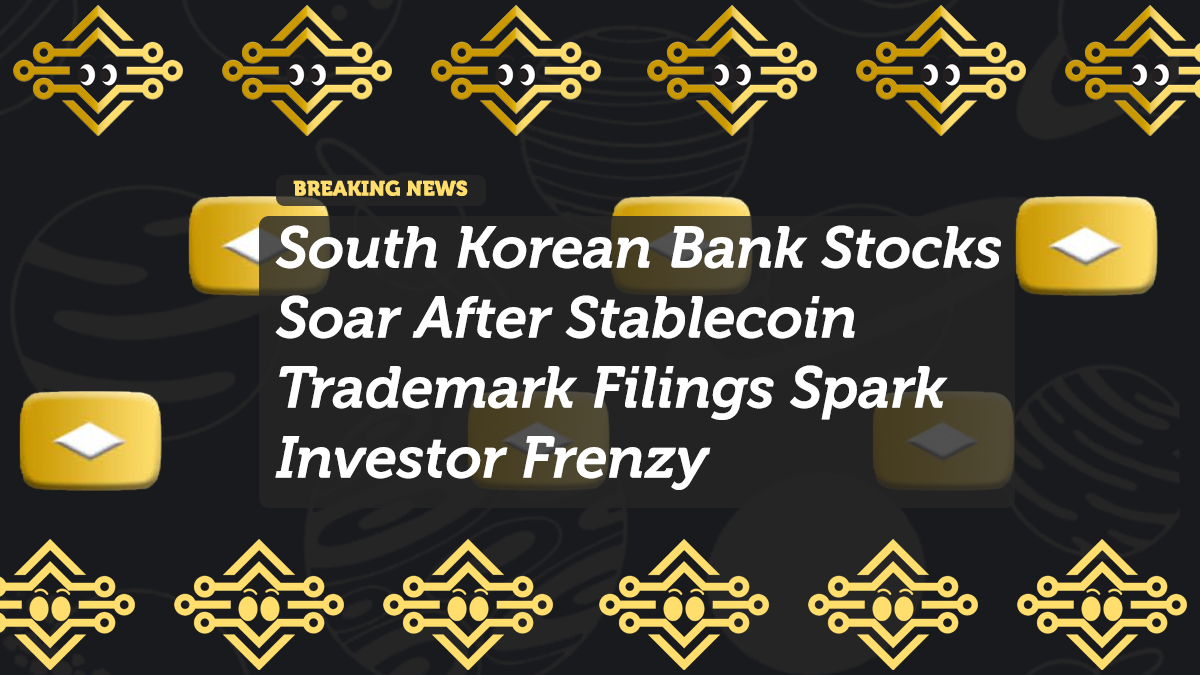
South Korean Bank Stocks Soar After Stablecoin Trademark Filings Spark Investor Frenzy
The stablecoin buzz has officially taken hold in South Korea’s traditional banking sector. Following a series of trademark filings for Korean won-backed stablecoins, some of the country’s most recognizable banks are enjoying a noticeable rally in their stock prices.
Kakao Bank, Kookmin Bank (KB Financial Group), and the Industrial Bank of Korea have all moved to secure intellectual property rights connected to future crypto asset development. These filings came hot on the heels of President Lee Jae‑myung’s inauguration, who ran on a crypto-forward platform.
While the specifics of these stablecoin initiatives are still under wraps, investors appear to be pricing in a digital asset future—and the numbers speak volumes.
By the Numbers: Who’s Surging?
Let’s break down the gains:
- Kakao Bank filed for over 12 crypto-related trademarks on June 23. The next day, its stock price jumped from $22.60 to $27—a 19.3% gain.
- Kookmin Bank, under KB Financial Group, also filed on June 23. Its stock climbed from $78 to $82 the following day and has since reached $89, a 13.38% increase.
- Industrial Bank of Korea followed suit with its filing on June 27. Its stock moved from $13.30 to $14.70, showing a 10.1% gain.
Clearly, even whispers of stablecoin adoption are sending bullish signals across the financial sector.
Why Are These Filings So Important?
The timing of these filings couldn’t be more strategic. South Korea’s new leadership has expressed strong support for blockchain innovation, and stablecoins are central to that vision.
Filing trademarks doesn’t guarantee a product launch, but it signals serious intent. These banks aren’t just testing the waters—they’re putting legal groundwork in place to become early movers in a potentially massive digital currency shift.
Kakao Bank’s 12 filings, for example, cover a wide range of crypto functions, from payment facilitation to blockchain settlements, indicating a broader push toward digital financial services.
Investor Reaction: Stablecoin Speculation or Smart Money?
While the filings alone don’t guarantee profits, investors are clearly interpreting them as a green light for digital transformation.
As the traditional finance sector looks to reclaim relevance in a rapidly tokenizing economy, stablecoins offer a perfect entry point. They’re regulated, pegged to fiat (in this case, the Korean won), and serve real-world use cases like payments, remittances, and even cross-border settlements.
This optimism isn’t unwarranted. The stablecoin market has grown globally to over $160 billion, and South Korea—with its high crypto adoption rate—could be primed for a localized boom.
Caution From Researchers: A Bubble Brewing?
Not everyone’s jumping for joy, though. A crypto researcher known as 100y, from the research firm Four Pillars, called the situation a “stablecoin bubble.” The criticism centers around how banks are using trademark filings as a stock catalyst—despite regulatory uncertainty and the absence of actual stablecoin products.
Their concern? That speculative euphoria could outpace real development, setting the stage for investor disappointment if these banks don’t follow through with viable launches.
Still, until regulators say otherwise, the market appears to be betting that these filings are the first of many steps into digital assets.
What Comes Next?
We’re likely to see a few key developments over the next quarter:
- Official product announcements from Kakao, Kookmin, or IBK.
- Partnerships between banks and local fintech or blockchain developers.
- Clarification from South Korea’s financial authorities regarding how bank-issued stablecoins will be regulated.
- More banks joining in, as FOMO begins to spread.
If the current momentum holds, South Korea could soon become a global leader in stablecoin innovation—especially if these digital won coins get integrated into mobile banking and payments apps used by millions.
FAQs
Why are South Korean bank stocks going up?
Because banks like Kakao Bank and Kookmin Bank have filed trademarks for stablecoins, signaling their interest in launching crypto-related services, which investors see as a growth opportunity.
Is South Korea planning to launch a government-backed stablecoin?
Not officially yet, but President Lee Jae-myung’s campaign promised to explore a Korean won-pegged stablecoin, setting the tone for market-friendly crypto regulation.
What is the risk of a “stablecoin bubble”?
Some analysts believe banks may be riding the hype with trademark filings before building viable products. If those products never materialize, current stock valuations may not hold.
Are stablecoins legal in South Korea?
While crypto is regulated, the framework for bank-issued stablecoins is still emerging. These trademark filings are likely a preemptive move ahead of future regulation.
Final Thoughts
Whether it’s hype or a strategic move toward digital modernization, South Korea’s biggest banks are making headlines with their stablecoin ambitions—and markets are responding accordingly.
If you’re keeping an eye on the future of global finance, this is a signal you can’t ignore. The Korean stablecoin wave may just be getting started










